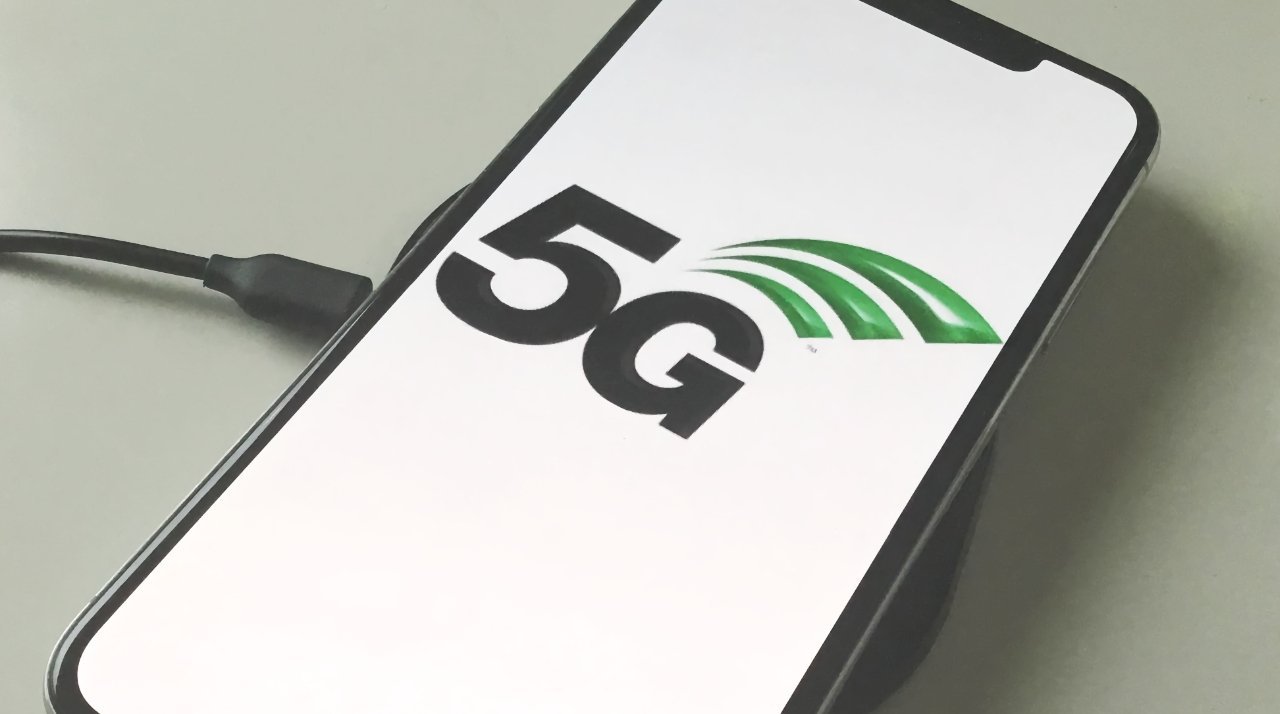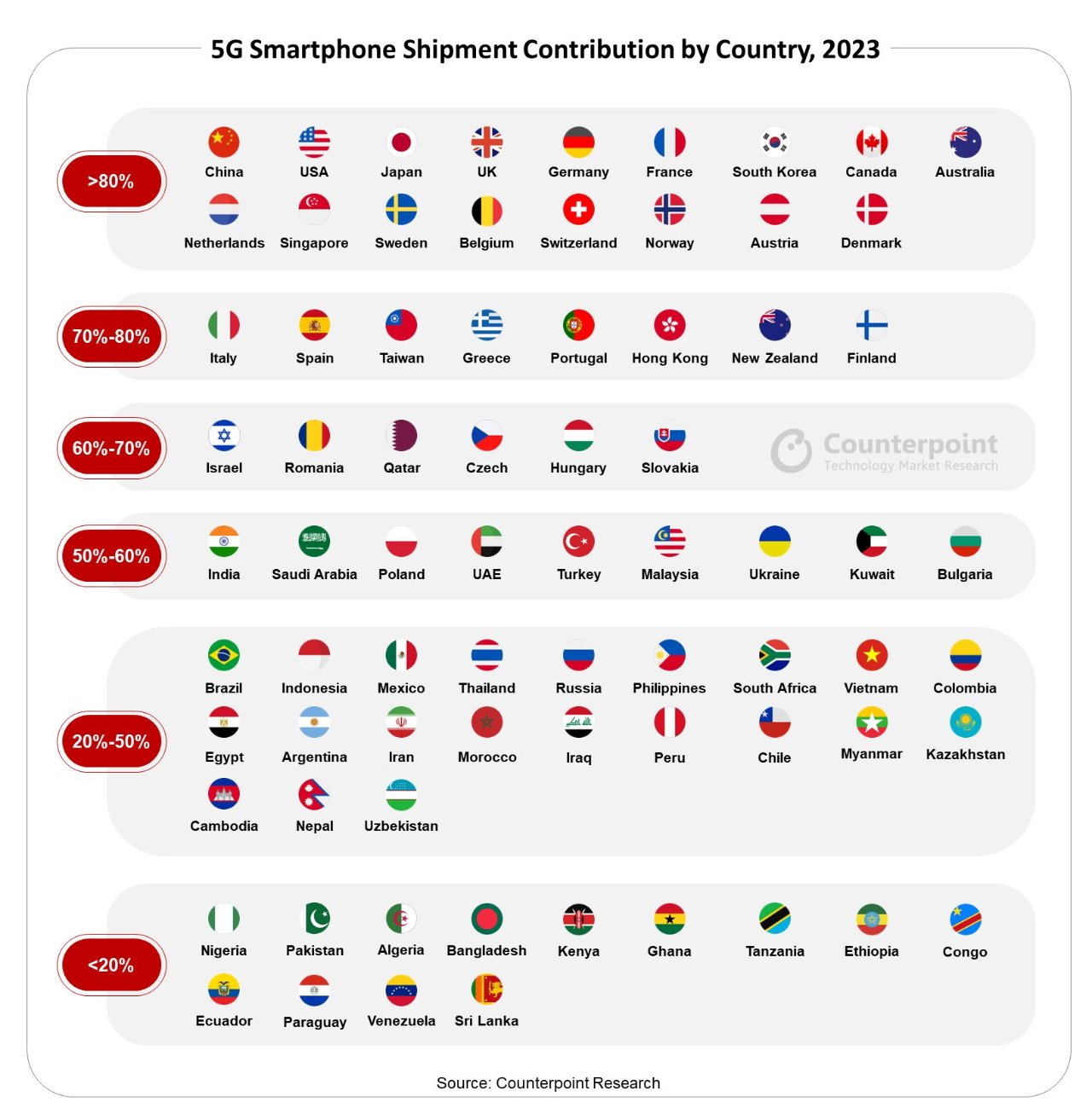Apple kickstarted 5G and now 2 billion smartphones have it
The worldwide total sales of 5G smartphones has now exceeded 2 billion, spearheaded by Apple's iPhone 12 and newer models.

Apple introduced 5G with the iPhone 12 in 2020
The iPhone 12 was Apple's first 5G smartphone and despite it launching late in October 2020, its high sales made it the world's most popular 5G phone within two weeks. Immediately dominating 5G sales, it also drove the market to 5G, according to Counterpoint Research.
New figures from Counterpoint say that worldwide 5G sales have now exceeded 2 billion, and done so a year faster than it took 4G.
"The launch of the iPhone 12 series, the first 5G-capable iPhones, significantly accelerated 5G adoption," says the research firm, "taking global 5G shipments to above 100 million units in a single quarter for the first time in Q4 2020."
"The momentum continued and the shipments hit a new record in Q4 2023," says Counterpoint, "reaching 200 million units in a single quarter."
Apple and Samsung are the most popular 5G brands, continues the report, with the two companies together selling one billion units. Counterpoint notes that a narrowing price gap between 4G and 5G components is bringing the technology to lower-price models, which is benefiting major Chinese brands.

Penetration of 5G across the world (Source: Counterpoint)
In China, Japan, the US and across most of Europe, over 80% of smartphones shipped in 2023 were 5G. Counterpoint says 5G penetration is 50% or more in 40 countries, while only 13 such as Nigeria and Paraguay have under 20% of sales on 5G.
Sales are not necessarily tied to countries where 5G is available or common, however. "Even in markets where 5G networks are not fully operational," says Counterpoint, "consumers opt for 5G smartphones to future-proof their investment."
All of Apple's iPhones use a 5G modem made by Qualcomm. However, Apple has been working for years on developing its own 5G chipset, despite reportedly having difficulties with the project.
Read on AppleInsider

Comments
5G has other modes, shorter range at higher frequency, which could be very useful for self driving cars communicating with each other and things like that.
This is what Counterpoint said back in 2022:
"After Apple shifted to 5G in October 2020 with the iPhone 12 Series, North America and Western Europe saw a natural increase in the sales"
https://www.counterpointresearch.com/insights/global-5g-smartphone-sales-penetration-surpassed-4g-first-time-january-2022/
As can be seen from the graph in that article there was a notable percentage jump in late 2020. That jump was an industry jump and included all other handset makers too and then leveled off and returned to showing a steady rise of 5G handset sales over time.
The real 'kickstart' happened from 2019 (under 20 million unit sales) to 2020 (almost 214 million sales) thanks to Huawei, Qualcomm, Mediatek and Samsung.
Globally, around around 1.38 billion smartphones were sold in 2020 (of which iPhones represented around 80 million for Q420). And of course, not all those 80 million iPhones [Statista] were 5G iPhones as the iPhone 12 wasn't the only phone in the lineup during 2020.
And the 5G modems on those iPhones were from the previous Qualcomm generation too and 'bolted on' (not on-SoC). They weren't representive of then bleeding edge 5G modems for most of 2021.
Also of note around the time was the impact of sanctions on Huawei's 5G options. Around the time, Huawei was one of the world's leading handset makers.
Also affecting the wider sales figures for 2020 were pandemic related issues.
Faster speeds are obviously a reality but also the capacity to cater to more users at those speeds is a necessity many people will never see.
If I'm watching YouTube over a sketchy stretch of rail (going through long tunnels) 5G allows for the app to preload enough of the stream to be able to watch without interruptions. My bank (probably all banks here) make use of 5G network slicing in combination with carriers to improve security so I always use 5G and 5G took about a year to reach my home. 4G took around 5 years to get to me and then I had to wait more for 4.5G.
The benefit of only having a very few models.
You try so hard to avoid acknowledging the obvious.
Easy math.
For FY 2021, Apple sold 234 m iPhones. Historically, 70 percent of those were new models, in this case with 5G.
Looks to me like Apple sold around 164 m 5G iPhones in FY2021.
Apple sold 80 million iPhones in the 4th quarter of 2020 (Apple's FY2021 Q1). Of those you would expect something above 56m iPhone 5g. Given that Apple sold 56 million of those 214 million that year, I'd guess that Apple sold more 5G than anyone else in 2020.
No other manufacturer was even close.
Funny. I thought I was stating the obvious and using accepted numbers.
But the kick-start happened when?
See above!
And in 2021, 5G was not restricted to premium phones. It had reached much farther into the market. Hence the results on the graph in the link I provided.
546 million 5G phones shipped in 2021 according to Statista.
It was an industry trend and Apple was simply part of the trend which Counterpoint had already put down to a 'natural increase'. That's a reasonable take.
For 5G modems as a component it was possibly Qualcomm but only because of sanctions against Huawei. Although Mediatek might have popped Qualcomm to that particular post.
For 5G ICT and patents it was probably Huawei.
Apple literally wasn't in the game, made a huge strategic goof and still seems to be trying to overcome the technical challenges.
"First"? And? What’s your point?
I'm always interested in reading about life experiences in other lands, but I should note that England is smaller than Illinois, where I reside. Building infrastructure in an embiggened land takes a while. (My Ps have regaled me with memories of electricity arriving in central Illinois in mid- to late-'40s. Dad said they splurged and had one outlet installed in each room despite misgivings that they would never have that many things to plug in.)
I've read over the last few years that 5G in South Korea has been a disappointment for users. Slower than expected and draining batteries faster than 4G. Apparently many users have simply downgraded to LTE. I'm not really holding out for 6G unless it's Apple that's going to spearhead it since it's unlikely — thought not impossible — that Apple will launch a cellular chipset that doesn't provide some benefit to utility..
This article is from last year and shows great performance for South Korea and a six fold improvement over 4G on average.
https://www.opensignal.com/2023/06/30/benchmarking-the-global-5g-experience-june-2023#:~:text=Absolute 5G Download Speed is,average 5G speeds top 300Mbps.
https://www.electronicsweekly.com/news/business/koreans-unhappy-5g-performance-2020-11/
https://asia.nikkei.com/Business/Telecommunication/Poor-5G-connectivity-disappoints-South-Korean-users
https://www.ft.com/content/1ff639a4-a85a-11e9-984c-fac8325aaa04
If I were one of those I do the same and ask for a refund.
The Open Signal averages paint a better picture of South Korea which has seen a major improvement overall. Even for those in the 6% in spite of them being right to be unhappy.
Please note that when Apple entered the "game", they shipped in one single quarter, 25% of the 2020 yearly total, hence the steepest slope of the graph you linked, from 0ctober 2020 thru December 2020. That's the kickstart.
Apple made no "strategic goof", and there was never a downside to how Apple both transitioned to 5G and invested in its own 5G modem.
interesting to read the comments here - several years ago when Apple had yet to add 5G to their phones there was a substantial amount of angst here on AI. At the time I remember asking people "Why do I need 5G on my phone?" All I got was people repeating the rote answers about the benefits of 5G, none of which really applied to your typical smartphone user. Now, 5 years later I see everyone posting things like "yeah, I got it but I never use it."